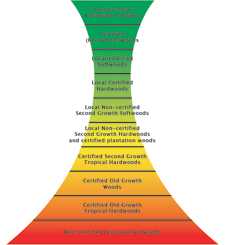|
|
 |

Homepage > What to Avoid and Alternatives > Rainforest Wood

Avoiding Unsustainable Rainforest Wood

 Rainforest Relief has been focused on reducing the imports of tropical woods into the US since we started the group in 1989.
Rainforest Relief has been focused on reducing the imports of tropical woods into the US since we started the group in 1989.
We have grown to become the leading US organization working to prevent the use of tropical hardwoods by US governments, corporations and individuals. To date, we have prevented the use of 11 million board feet of imminent or proposed dimensional tropical hardwoods as well as hundreds of thousands of cubic feet of plywood and tens of thousands of pieces of furniture made of rainforest wood (see our Successes).
The destruction of tropical forests is generating the largest mass extinction on Earth since an asteroid struck Earth 65 million years ago, wiping out the dinosaurs and 75% of all life on the planet. It is estimated that the current mass extinction — perpetrated by one species, Homo sapiens sapiens — is occurring at a faster rate than that which followed that cataclysm.
There is no more pressing problem facing the world than the destruction of tropical forests. Logging is largely to blame for this loss. According to the United Nations Food and Agriculture Organization (FAO), 70% of tropical deforestation due to agricultural clearing is precipitated by logging and mining roads.
Logging in the tropics initiates a chain of destruction like no other activity, as roads bulldozed by loggers — mostly illegally — provide access to other extractors and farmers who complete the process of deforestation.
According to World Resources Institute, a logged tropical forest is 8 times more likely to be completely deforested than one remaining unlogged.
The vast majority of the wood sought by the illegal crews punching new roads into pristine forests is wood for export — high value woods in demand in northern industrial countries.
The US is the largest importer of tropical hardwoods. Much of it is high-value lumber, such as mahogany (South American and African), ipę ("Brazilian walnut"), jatoba ("Brazilian cherry"), ramin and nyatoh, used for furniture, doors, coffins, boardwalks, decking, plywood, and flooring. Vast volumes are imported as inexpensive plywood (called lauan) from southeast Asian rainforests, used for paneling, cabinets and furniture interiors and backing, set construction, tractor trailers, subflooring and doorskins. Still more comes in as marine grade plywood made with okoumé and African mahogany, used in boat building and for the flooring of trucks and shipping containers. Rainforest wood is so ubiquitous that it's even found in bathroom plunger handles and pencils.
In order to spare the world’s rainforests, we must reduce the imports of tropical woods by at least 90%. The remaining 10% must only come from operations that are not from old growth logging and are independently certified as well managed, accredited by the Forest Stewardship Council.
Here’s a rundown on the facts that keep us so focused on tropical hardwood imports:
Earth’s biodiversity is conservatively estimated at 14 million species.
At least 50% of all species are found only in tropical rainforests;
Earth’s rainforests are being destroyed at the rate of 1.5 acres per second worldwide
At the current rate of destruction, all accessible rainforests except a few parks and preserves will be destroyed in 40 years
Based on these very conservative numbers, because of tropical deforestation, Earth is losing to extinction an estimated 380 species per day;
This is the greatest extinction of species to have occurred on Earth in the last 65 million years, and possibly ever;
The greatest factor in the loss of tropical forests is logging for timber;
The UN Food and Agriculture Organization has stated that 70% of tropical deforestation from shifting agriculture is precipitated by logging roads (World Resources Institute restated this research showing that a logged tropical forest is 8 times more likely to be completely deforested than one remaining unlogged);
Logging for export is the greatest factor leading to illegal logging and new logging operations;
High value species for export like mahogany, ipę, jatoba and virola in the Amazon, African mahogany, wenge, oklumé and padauk in Africa, ramin, apitong, keruing, kepmpas, kapur, nyatoh and balau in Malaysia and Indonesia, are targeted by legal and illegal loggers;
The majority of high value species are logged for export, for instance, 70% of mahogany cut in Brazil is exported and 90% of okoumé cut in Gabon is exported;
High quality standards and the demand for long lengths (such as for New York City’s boardwalks) necessitates logging up to 10 times more rainforests to fill the order;
The US is the largest importer of tropical woods by dollar value;
The US is the largest importer of mahogany;
The US is the largest importer of ipę;
The 8.5 miles of New York City’s coastal boardwalks have been converted entirely to ipę, starting in the late 1960s, which is now being replaced on a rotating basis;
These boardwalks comprise an estimated 6,800,000 board feet of Fine Export Quality (FEQ) four-side-clear 2x4 ipę boards, ordered in lengths of 14 to 20 feet;
Our research shows that as little as 38 board feet from an entire ipę tree meet the requirements of FEQ 2x4s in lengths greater than 7 feet, that is, the mills may be getting as little as four 20'-long 2x4s that meets the four-side-clear standard from each ipę tree logged;
This means that as many as 89,000 acres were already logged to complete the decking of NYC’s boardwalks, and they are starting to replace the decking with ipę for the second time, which will necessitate logging another 89,000 acres;
This doesn’t account for tropical hardwoods used for NYC’s tens of thousands of park benches and playgrounds (ipę), the terminals of the Staten Island Ferry (greenheart from Guyana), the decking and benches of the Brooklyn Bridge (greenheart), the decking of park bridges (such as the Bow Bridge in Central Park, decked with ipę), and railroad cross ties used for subway tracks (such as the G, the 4-5-6 and the 2-3 lines, the track ties of which have been replaced with ekki from the rainforests of Cameroon, Gabon, Ivory Coast or Liberia);
New York City is the single largest consumer of tropical hardwoods in North America.
It is imperative, if we are to spare any remaining rainforests for the future of life on Earth, that we end the logging, exports, imports and use of unsustainably harvested tropical hardwoods.
You can help by avoiding wood products that originate from endangered forests and getting others — such as your town or city or your company or school — to do so as well.
You can also help by supporting our campaigns to end the imports and use of rainforest wood.

In this section, you can learn about which woods should be avoided and more environmentally sound alternatives.
|
 |

|
|
















